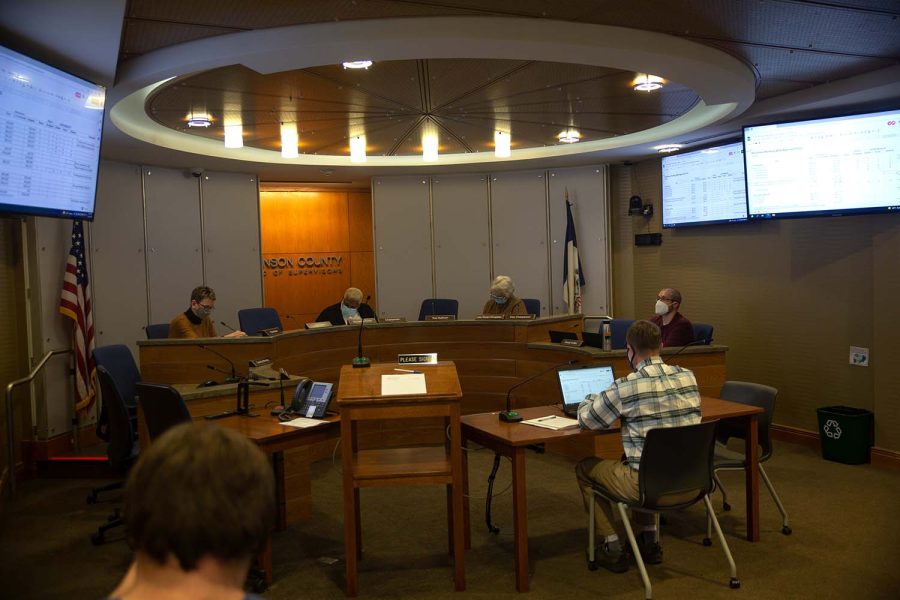Johnson County official says public misunderstood Direct Assistance Program and eligibility requirements
Johnson County Grants Coordinator Donna Brooks said the public’s confusion stems from an Iowa City Catholic Worker press release last November, but the organization stands by their messaging.
The Johnson County Board of Supervisors discuss during a budget meeting at the Johnson County Administration Building on Jan. 12, 2022.
January 26, 2022
Johnson County officials tried to clear up what they called misinformation about the county’s Direct Assistance Program on Wednesday.
Donna Brooks, Johnson County grants coordinator, said the county’s Direct Assistance Program, which provides one-time financial support to residents who faced negative economic impacts as a result of the COVID-19, was never labeled as an excluded workers fund.
During the Johnson County Board of Supervisors work session meeting on Wednesday, Brooks said the misunderstanding stems from a November 2021 press release by the Iowa City Catholic Worker House, who have played a key role in advocating for payments for excluded workers.
Brooks said she, as well as the rest of the county American Rescue Plan Team, avoided calling the program an excluded workers fund because other sections of the population that didn’t receive a COVID-19 stimulus check also need additional money, and there are other eligibility criteria beyond whether or not a person received a stimulus check.
“The ARPA leadership team from the beginning has been very diligent about not calling this an excluded workers fund because there were people beyond those Latino workers that did not receive stimulus checks, including university students and residents that earned more than $75,000 a year,” Brooks said.
David Goodner, Catholic Worker House trustee and co-founder, noted that the program proposal that was debated for months and passed unanimously on Nov. 18 was ‘$2 million for payments to workers who were ineligible for previous relief programs,’ which is the definition the Fund Excluded Workers Coalition uses for excluded workers.
“The county is lying and trying to rewrite history,” Goodner said. “…We demand Johnson County drop its plans for an exclusionary casino-style lottery, prioritize excluded workers, and fully fund the Direct Assistance Program now,” he said.
The supervisors approved $2 million in federal funding for “payments to workers who were ineligible for previous relief programs,” according to county documents.
But according to more specific rules defined in December, the eligibility for the program goes beyond people ineligible for previous relief programs. To be eligible for the county’s Direct Assistance Program, applicants must show they:
- Lived in Johnson County on March 1, 2020, and continue to live in Johnson County
- A legal adult or emancipated minor
- Earn less than $45,000
- Experienced unemployment, housing insecurity, food insecurity, or exclusion from federal pandemic stimulus payments and expanded pandemic unemployment benefits following the COVID-19 pandemic.
- Residents who participate in state and federal assistance programs like SNAP.
Editor’s note: The Daily Iowan has previously used the term “excluded workers” when referring to the direct assistance fund since those guidelines were set. While DI reporting has made clear that the program is available for people who show negative impact as a result of COVID-19 and not just those defined as excluded workers, we regret confusion it may have caused. Previous articles and headlines have been updated.
The Iowa City City Council recently announced plans to transfer $1.5 million from its American Rescue Plan Act funding to Johnson County’s Direct Assistance Program through a lottery system where county officials randomly select applicants.
The total offered through the program is now $3.5 million after a vote by the supervisors to invest $2 million from the county’s American Rescue Plan funds for COVID-19 relief.
Protesters rallied at Monday night’s Johnson County Board of Supervisors joint entities meeting, demanding the county change how it disperses the Direct Assistance funds and prioritize undocumented immigrants and other people specifically left out of federal pandemic relief.
During the public comment section of Wednesday’s work session, Jane Davis, member of St. Thomas More Parish in Coralville, told the supervisors that excluded workers should not have to receive funds through a lottery system.
“Offering American Rescue Plan Act money through a live lottery is clearly exclusionary. Most people will lose,” she said. “[Workers] have shared their stories which most of us can not imagine.”
Residents of Polk County in Iowa have also called for a fund for workers excluded from federal COVID-19 relief funding.
Johnson County Special Projects Manager Ray Forsythe said the program has to be within compliance with the U.S. Treasury’s final rule for dispersing state and local fiscal recovery funds.
“That’s the most difficult part of any project because multiple times in [the Treasury’s guidelines] it says misuse of funds potentially could have to be returned to the Treasury,” he said. “It’s our job as staff to help you create programs that are in compliance and don’t put the county’s fiscal funds at risk.”
Brooks said the Direct Assistance Program was strictly designed to be an emergency relief program following U.S. Treasury guidelines.
“This is not a hazard pay program. This is not a premium pay program,” Brooks said. “In order for Johnson County to provide hazard pay or premium pay, [Johnson County] would have to provide it by grant, or by loan to employers.”
Sabine Martin contributed to this report.



